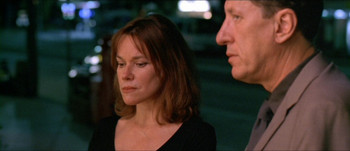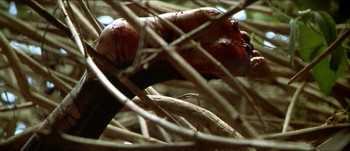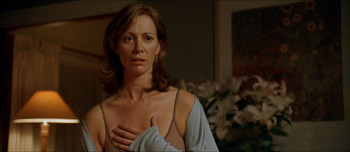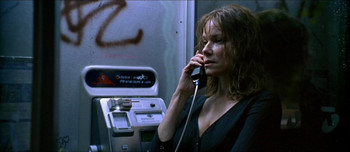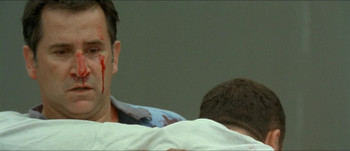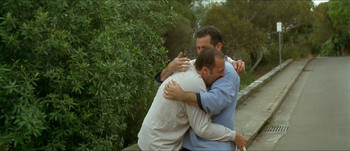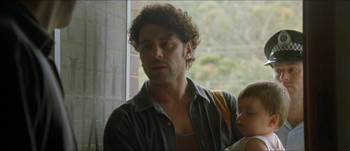A submission to Counting Down the Zeroes, a project by Ibetolis at Film for the Soul.
Heed The Spoiler’s Creed.
Lantana
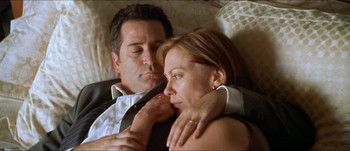 Much to my surprise, I can find no reference to the nearly universal cinematic “wedding-ring rule”: Any time a wedding ring is a prominent prop or visual motif in a movie, infidelity will be a central theme. The obverse: Any movie with infidelity as a central theme will feature the wedding ring as a prop or visual motif.
Much to my surprise, I can find no reference to the nearly universal cinematic “wedding-ring rule”: Any time a wedding ring is a prominent prop or visual motif in a movie, infidelity will be a central theme. The obverse: Any movie with infidelity as a central theme will feature the wedding ring as a prop or visual motif.
I could offer dozens of examples, but the best might be Lantana, which is obviously about sexual straying but has a greater interest in marriage overall, especially the underlying, intertwined issues of trust and honesty. Although it’s nearly too blunt in its themes, the movie feels continuously right, nailing not only relationship dynamics but interred grief and pain. Throughout, it gets the tone, nuance, and scale of life correct.
And while it’s cheap in the way it misdirects the audience, its methods are easy to justify, and it’s an engaging mystery.
With nearly equal weight given to story and character and theme, and a genuine curiosity about even minor players; Lantana is exceptionally well-balanced. Emotions and reactions are properly proportional to their causes, and its events are appropriately major and dramatic in the context of the real world but downright subdued for a fiction. Adapted by Andrew Bovell from his play and directed by Ray Lawrence, Lantana is quietly devastating.
The narrative sounds convoluted, but it’s actually elegantly austere. Detective Leon Zat (Anthony LaPaglia) is having an affair with Jane (Rachael Blake), who has recently split from her husband and has a simultaneously genial and strained relationship with the couple next door, Paula and the unemployed Nik. Leon’s wife Sonja (Kerry Armstrong) suspects an affair and is seeing therapist Valerie (Barbara Hershey), whose daughter was murdered and who suspects that her husband, John (Geoffrey Rush), leads a secret life. And over all this hangs a dead body seen in the film’s opening, as the camera looks deeply into the titular shrubs.
As Roger Ebert correctly summarized:
“We are reminded of the opening of Blue Velvet, which pushed into lawn grass to suggest dark places hidden just out of view. … Ray Lawrence’s film is like Robert Altman’s Short Cuts or Paul Thomas Anderson’s Magnolia in the way it shows the lives of strangers joined by unsuspected connections.”
These are apt comparisons, but they’re also instructive for their contrasts. Lanatana – which was named 2001’s best movie by the Australia Film Institute – is tightly circumscribed and intimate compared to the sprawl of Short Cuts and Magnolia, and it lacks the apocalyptic punctuation of an earthquake or frogs. And put beside the transgressions of David Lynch’s Blue Velvet, Lantana looks downright mundane.
Actually, it is mundane, dealing with troubled suburban marriages and middle-aged angst and the hot action of a Latin dance class and (gasp!) a teenager smoking marijuana. Blue Velvet, Short Cuts, and Magnolia imply filmmaking rigor and excitement and danger, and Lawrence – who has made three features in a quarter century – certainly delivers the rigor.
As for the other two, Lantana is deliberately languid, and even more quotidian than it hints. A murder is just an accident, and the imagined connection between the distant John and the gently aggressive therapy client is indeed the product of an anxious mind.
The film sets up lurid scenarios for the audience and the characters, and then it delivers a truth that is utterly ordinary. But because it’s so everyday real, it’s actually more affecting. John’s final confession to Leon is heartbreaking only because his decision was so commonplace and capricious. And it’s surprising because we expected something more cinematic and dramatic. The audience is nearly disappointed that he wasn’t buggering his wife’s patient.
Yet the fact that John isn’t cheating underscores that Lantana’s interest in infidelity is primarily to access larger issues. The movie appeals to our prurient interests and then guides us to a different place.
The hide, hint, lead, and disabuse narrative strategy (Who is the dead woman, and how did she die? Is Geoffrey Rush having a gay affair? What did Nik do?) makes sense in one way, mimicking characters’ suspicions. But that manipulation feels like a cheat – particularly in light of Lantana’s themes – creating a tension between the film’s means and ends.
And the movie doesn’t much care about its women. It was written and directed by men, and its two male leads are … complicated, but its women are largely interchangeable. The initial mystery, after all, is which of its three female leads will end up dead. Sonja and Valerie hit many of the same notes, questioning their marriages and husbands and looking perpetually uncertain in the world. Meanwhile, LaPaglia and Rush have meaty roles with characters full of ambiguity, and Lantana makes room for Jane’s husband and Valerie’s patient and Nik. While the film deals with marriage seemingly evenhandedly – neither Leon nor John is let off the hook for his shortcomings – it’s clearly more interested in the male side of the equation, and clearly from the male perspective.
I cite these less as criticisms than problems, in the sense that they make Lantana appealingly knotty; it cannot be solved cleanly or easily, which makes the movie itself a mirror of its concerns.
The film is also, despite its careful construction, undoubtedly alive, particularly in seemingly tangential moments – but you should avoid the temptation to call them “small.” There’s the viscerally sickening collision of a jogging Leon with another man that spurs the expected reaction from the short-fuse cop that then gives way to a surprising tenderness. There’s Nik’s practical, sad desperation when the police come to question him and he needs somebody to watch his kids, and the only person available is the neighbor who ratted him out. Then there’s Leon lying to John about whether he’s ever cheated on his wife, as the audience comes to the realization that the cop might simply be incapable of telling the truth; he has no reason to fib here, nothing to protect, and yet … .
These are hardly superfluous. Leon’s accident paves the way for his own climactic emotional release, for example, and each scene supports the whole. You just need to figure out why it’s important.
Which brings us to Lantana’s oddest bit: the anger of Nik’s wife Paula after Jane has tidied up her house while she was visiting her husband at the police station. Jane means it as an act of kindness – a favor. Yet Paula takes great offense.
And here the movie works subtly: Of the four marriages spotlighted in Lantana, the strongest and most honest belongs to Nik and Paula. They lack money and status, but they’re up-front with each other and have earned the trust of their partner. Their house is a disaster, of course, but the appearance of order is pretty meaningless, as Leon and Sonja and John and Valerie can attest. Nik and Paula can live with the mess, because the foundation is solid.
So the house is a metaphor, and Jane has quite literally violated Paula’s domestic space, and the wife in the movie’s only good marriage won’t tolerate it.
And that is precisely why it’s a good marriage.

